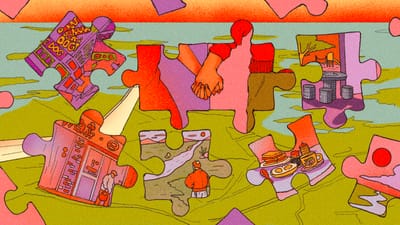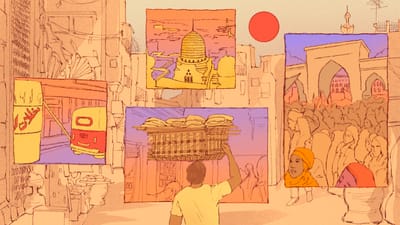Twenty years ago this week, the world’s first so-called “Internet war” was also Singapore’s first cable TV war, a 24/7 spectacle like never before. By 1999, Singapore Cable Vision (SCV) had completed its island-wide cable network, which offered dedicated news channels like BBC and CNN. By mid 2001 SCV, which later merged with Starhub, had 265,000 cable TV subscribers in Singapore, in a population of just over four million. They might have watched the tragedy of 9/11, and the bombs over Baghdad on March 19th-20th 2003, as a US-led coalition began what it called Operation Iraqi Freedom.
The initial imagery was dramatic but carefully distanced. From across a river one view showed buildings precisely targeted, as if detonated from within, explosions releasing what looked like celebratory fireworks into the night sky. Then there were the green-tinted, night-vision views of mortar fire and the black-and-white rolls that showed targets moments from destruction, the moment of impact concluding a narrative journey that one hadn’t signed up for but had to sit through. This was mass media pixelation masking flesh-and-blood, a cinematic, PG-13 flick that desensitised us, that kept us in la-la land.
The only humans we really saw in those early days were joyous Iraqis welcoming “liberation” and the coalition’s commander-in-chief, George W Bush. “To free Iraq, to save its people, and to defend the world from grave danger,” he said from the Oval Office, flanked by gold-framed photos of his daughters and wife. For those who’ve believed in a post-world-war-2, US-led security order in East Asia, it all had a comforting precision about it, the forces of good and evil neatly partitioned. One almost felt like sitting next to the avuncular “Dubya” in front of the fireplace, with marshmallows and hot chocolate, and thanking him, and the American people, for once again saving us. (Bush's nickname is a play on “W”.)
Well before Al Jazeera was widely watched, it was easy to be entranced by reporting from mainstays of the American and British establishments. Yet not only did the gruesome human cost of this invasion soon become clear—ultimately about 4,600 American military personnel and about 300,000 Iraqis directly from the fighting—but the very rationale for it, centred on weapons of mass destruction (WMD), was within months exposed as a lie.
As “Iraq” dragged on for longer than the early triumphalists ever imagined it would, the cable TV war transitioned from faux spectacle to a genuine exploration of evil. This included the manipulative propaganda machines in the West, concocting enemies wherever enemies were needed, and the barbarity of groups like ISIS, the most dominant of a new breed of jihadists to emerge from the ashes of a civil war sparked by the invasion. Their radical ideologies continue to threaten societies everywhere, including Singapore.
In the two decades since, democracies have engaged in relentless self-interrogation. Media channels, from the BBC to The New York Times, expressed regret for their coverage. Books and movies challenged official narratives. Many have decried Bush’s seeming rehabilitation in the age of Trump. The 2016 Iraq inquiry (Chilcot Inquiry) by the UK concluded that Saddam Hussein did not pose a threat to British interests; the intelligence on WMDs was flimsy; and that the war was unnecessary. Many British politicians have called the war illegal.
Even as all this has happened, Singapore has yet to publicly reassess its own involvement in the invasion. The last apparent statement on the invasion from the Ministry of Foreign Affairs (MFA) is from 2003, which recites the words of S Jayakumar, then foreign minister: reaffirming the belief that Saddam had WMDs and that the lack of a United Nations (UN) Security Council resolution “cannot be taken as an excuse for inaction.” (Read: to hell with UN protocols.) This past week, as media channels around the world have offered their own 20th anniversary retrospective, Singapore’s mainstream media has said nothing about our involvement.
“It is clear to everyone, unless that person wears blinkers, that this is a war to remove the weapons of mass destruction from Saddam Hussein,” said Goh Chok Tong, Singapore’s then prime minister, a week after the invasion had begun. Goh avoided discussion of Iraq in his two-volume memoirs and, along with the MFA, did not respond to Jom’s requests for comment. Their inability to own up to their past does not bode well for Singapore’s foreign policy future.





